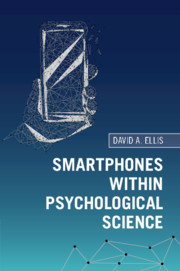Book contents
- Smartphones within Psychological Science
- Smartphones within Psychological Science
- Copyright page
- Dedication
- Contents
- Figures
- Tables
- Preface
- Acknowledgements
- Introduction
- Chapter 1 Smartphone Usage
- Chapter 2 Health and Behaviour Change
- Chapter 3 Social Interaction and Interpersonal Relationships
- Chapter 4 Personality and Individual Differences
- Chapter 5 Cognition
- Chapter 6 Safety and Security
- Conclusion
- References
- Index
- References
Chapter 2 - Health and Behaviour Change
Published online by Cambridge University Press: 11 September 2020
- Smartphones within Psychological Science
- Smartphones within Psychological Science
- Copyright page
- Dedication
- Contents
- Figures
- Tables
- Preface
- Acknowledgements
- Introduction
- Chapter 1 Smartphone Usage
- Chapter 2 Health and Behaviour Change
- Chapter 3 Social Interaction and Interpersonal Relationships
- Chapter 4 Personality and Individual Differences
- Chapter 5 Cognition
- Chapter 6 Safety and Security
- Conclusion
- References
- Index
- References
Summary
Smartphones and associated wearable devices have gained a greater prominence directly within health psychology. Not only can such devices track health and answer a variety of research questions in relation to physical and mental health, but real-time feedback can also be augmented to support subsequent behaviour change interventions. There are literally 1000s of smartphone health apps that aim to change behaviour. Hence, health psychologists have been heavily involved with the design and testing of interventions (Ellis and Piwek, 2018). In addition, there are increasing numbers of interdisciplinary groups who focus on such interventions. However, while the research landscape is now littered with many well-publicised successes and failures, very little is known when it comes to understanding why such results are occurring even for users who engage with a long-term smartphone/wearable intervention. Despite having plenty of scope for development, progress has stalled because existing adaptations continue to be poorly designed from both a theoretical and patient perspective.
With these issues in mind, this chapter points towards where psychological research is using smartphone sensing methods that can quantify health related behaviours on a larger scale. It also considers how psychology can make a key contribution in the future. For example, while the process of behaviour change remains complex, additional research is urgently needed to understand how individuals, devices, and related technologies can be designed and implemented if interventions are to become widespread across healthcare systems in the future (Piwek et al., 2016; Ellis and Piwek, 2018)
Keywords
- Type
- Chapter
- Information
- Smartphones within Psychological Science , pp. 44 - 72Publisher: Cambridge University PressPrint publication year: 2020

